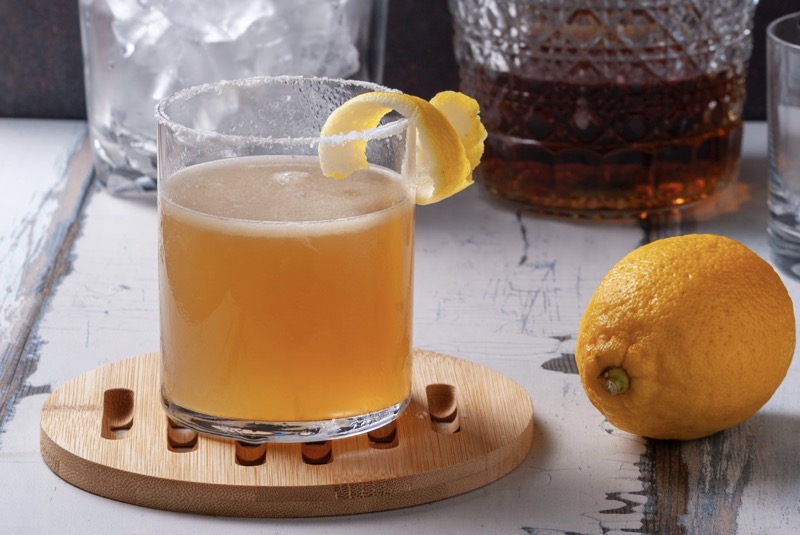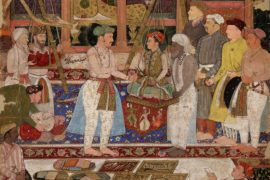Fancy cocktails make fancy parties. Punch is one of the most popular drinks. A bowl with a ladle serving a drink— marinated with pieces of tangy-sweet fruits filled to the brim and perfectly spiced—is often where all the people gather to fill up their glasses. Did you know that Punch is considered the forefather of cocktails? More so, did you know that the fancy party drink has Indian origins?
‘The monarch of mixed drinks,’—as remarked by David Wondrich in Punch: The Delights (and Dangers) of the Flowing Bowl—Punch is a balance of flavours in a bowl. The etymology of Punch comes from the Sanskrit word panchan or pancha, which means five. Originally, it stood for five flavours found in the drink—sweet (sugar), bitter (spirit), tangy (citrus), water and spice (nutmeg). Today, a Punch can consist of four flavours or six or more, depending on its preparation.
The story of Punch begins in the early seventeenth century. Sailors on board British East India Company ships drank heavily to make journeys bearable. Ten pints of beer per day was a part of their allowance. However, when they sailed through the tropical regions, the beer would get spoiled.
‘They were 13,000 miles away from any English beer or wine source, and they had nothing to drink. And English sailors …respond very poorly to that,’ said Wondrich in an interview with NPR. To fulfil their supply of alcohol, the Brits turned to local ingredients in their colonies. Mixing citrusy fruits, arrack (rum-like liquor distilled from Palm sap produced in South Asia), spices, and sugar, Punch came into existence.
No pieces of evidence indicate who exactly invented Punch. However, the first reference to Punch is in a letter sent by Robert Addams, an officer of the British East India Company. Written on September 28, 1632, he greeted his colleague:
I hope you will keep good house together and drincke punch by no allowance.
Six years later, the first recorded recipe of Punch is mentioned by Johan Albert de Mandelslo. Mandelslo, a Germand manager at a factory in Surat, a port on the west coast of India, recorded that his workers often consumed a concoction of ‘aqua vitae, rose water, juice of citrons, and sugar.’
It is unclear if the British invented the drink or if they adapted it to a drink locally made in India. However, it is evident that it was made in the colony, and their back-and-forth from India resulted in the popularisation of the drink.
‘Punch began in the British East India trade, as far as we can tell,’ said Wondrich, in a tale he narrated to the Difford’s Guide. ‘Records are pretty spotty about this sort of thing, but English sailors ran out of beer and they ran out of wine, and you can’tcan’t have a boat full of English people without something to drink. So, some bright spark had the idea, what if we make artificial wine from spirits.’
Rum was not an expensive luxury, but taking swigs straight from the bottle resulted in overpowering alcoholism. Punch was a method to tone down the rum, a substitute for wine. The coconut arrack, a native of India, was diluted with water to match its strength, mixed with lemon for some acidity, and sweetened like the preferred wines of the time.
The citrus protected the sailors from scurvy during their lengthy journeys, and the concoction heavily increased the shelf life and proved delicious. When England colonised the sugar-producing countries, rum replaced the rationed beer. Sailors were ‘always well stored with rum, sugar, and lime juice to make punch, to hearten their men when they are at work,’ wrote William Dampier, who authored the 1697 book A New Voyage Around the World.
Rum was a major Caribbean import. Incoming ships would carry gallons of the drink that would use much less space in comparison to beer and provide a longer shelf-life. It was an easy replacement for French brandy as England was constantly in conflict with France.
‘Rum mixed with sugar and lime made the nasty, brutish, short life of the average Caribbean combatant worth living,’ wrote Jeff Berry in Potions of the Caribbean.
It was a rum punch that lured the commander-in-chief of England’s Caribbean fleets into a privateer contract with a notorious pirate, Captain Kidd. The event of 1688 is mentioned in The Pirate Hunter by Richard Zacks. As sailors sailed back to London, Punch was introduced to Britain. It became an en-vogue for investors who funded the ships to visit the docs with friends and share Punch as a social beverage onboard. Soon, being a non-taxable beverage, Punch took over the bars and coffee places. It became the drink of English noblemen and aristocrats for centuries as the ingredients were all imported and expensive.
Possessing punch bowls was a sign of affluence. Simon Difford of Difford’s Guide mentions accounts of the extravagantly wealthy men ordering punch bowls big enough for three children to play in and melting down money to demonstrate that punch bowls were a showy addition.
Unfortunately, the drink lost its charm to a fast-paced life in the Victorian era as people stopped spending time sitting in bars sipping on liquor for long hours. Wondrich mentions the famous novelist Dickens as having ‘entertained’ his guests with a punch. However, in the mid-1800s, it was rather an ‘old-fashioned’ throwback.
‘Queen Victoria was very opposed to the lax moral standards that the upper classes in particular held to in her predecessor’s days. She didn’t like their habit of getting grossly drunk on Punch, champagne and wine,’ Wondrich elaborated.
Today, Punch has regained popularity as a fashionable drink at parties. Non-alcoholics, try an unadulterated concoction of fruit liquids. Many different kinds of ‘fruit punch’ are sold commercially. They may also be non-alcoholic or carbonated cocktail mixers. Hawaiian Punch, Hi-C, and Minute Maid are three well-known brands in the United States.
Punch is great for serving cocktails to entertain bigger crowds. However, Wondrich warns the audience of NPR that ‘Punch should not be the strength of a cocktail. It’s got to be something considerably less dangerous…The whole point is it’s a social drink… You’re supposed to keep going back to the bowl, and every time you go back to the bowl somebody else is there and you talk to them…and it ends up being very jolly and pleasant.’
-30-
Copyright©Madras Courier, All Rights Reserved. You may share using our article tools. Please don't cut articles from madrascourier.com and redistribute by email, post to the web, mobile phone or social media.Please send in your feed back and comments to editor@madrascourier.com











